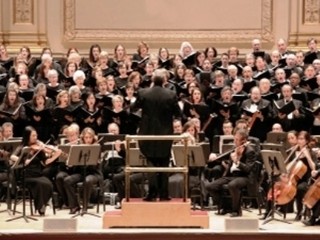|
Back
Religion, Both Sacred and Secular New York
Isaac Stern Auditorium, Carnegie Hall
02/05/2016 -
Arvo Pärt: Te Deum
Ludwig van Beethoven: Mass in C, Opus 86
Caroline Worra (Soprano), Leah Wool (Mezzo-soprano), Dominick Chenes (Tenor), Corey McKern (Baritone)
New York Choral Society and Orchestra, David Hayes (Conductor)

NY Choral Society (© Courtesy of the Artists)
”Unbearably ridiculous and detestable. I am angry and mortified.”
Prince Nikolaus Esterházy, upon receiving and apparently reading Beethoven’s C Major Mass
Even in that remote frontier palace on the wasteland border of Hungary one wouldn’t expect any Prince to issue such invective. Perhaps a few of his three-hundred-odd servants were late maneuvering through the 400-odd rooms bringing him his Olaszrizling wine, or perhaps his dyspepsia was acting up, or unexpected relatives were coming for dinner.
More likely, the Prince was comparing Beethoven’s Mass to the music of Haydn, his favorite musician finding it inferior. In fact, Beethoven was probably trying to imitate Papa Haydn, a composer for whom he had minor contempt.
But as performed last night by the New York Choral Society under the energetic baton of David Hayes, the Mass, proved at least listenable. And at times actually inspiring.
Comparing this to either Haydn or Beethoven’s own Missa Solemnis is hardly beneficial. When Haydn wrote his great Masses, they rang out. His minor religious works still showed a natural penchant for old-style classical methods. As conducted by Mr. Hayes last night, the fugues sounded well-polished, the choruses were beautiful, though rarely inspired, and for some reason, Beethoven gave his four soloists little solo material.
The New York Choral Society, though, made the most of it. In fact, the opening Kyrie had the kind of buildup from its soft unfolding to a gorgeous full-bodied, almost Handelian climax in seven or eight quick-moving measures.
Add to this a propulsive Credo and a Sanctus which sounded quite “holy” as contrast from the usual explosive Sanctus sections of other religious documents. And while the piece had all the Classical forms, the gentle soft ending was rare for the composer.
The New York Choral society and Orchestra held good balance throughout. The program listed about 200 singers, so their clarity over the an orchestra one-quarter their size easily apparent. Yet the Orchestra itself, with several members I recognize from the Orpheus Orchestra, gave a full-bodied texture to the work.
To repeat, the soloists had only a few lines to themselves, but all four were experienced enough to blend into the gracious–and often grand–performance.
One could listen to the Beethoven Mass with secular feelings. That was not possible with the opening work, Arvo Pärt’s Te Deum. And therein lay an unmusical problem.
This may be unfair, but the music of Arvo Pärt needs a spiritual environment. The harmonies are what we imagine Byzantine harmonies to be, the sounds are so intense that they should freeze out anything the least bit extraneous. Only superficially could one say this was Tantric or trance-like. In the Te Deum, the sensations should be more than musical. They must be elemental, stirring. The Cries and Whispers (to quote Bergman) don’t have to physically resonate, but the audio must have its own aura.
Alas, my otherwise excellent Carnegie Hall seat in the Orchestra was at the core of a small maelstrom. Three rows ahead, a dozen schoolkids were appropriately fidgeting. (Kids have rituals and gods and legends, but they don’t have religion, and Pärt is religion.) Across the aisle, a bored businessman turned his Ipod on and off, oblivious of the audience or the players. (And too far away for me to forcibly tap him on the shoulder or kick his damned seat!)
For the second-half Beethoven, the kids had departed, and the Philistine businessman could be ignored. For Arvo Pärt, this was near disaster.
Still, this is such a powerful work that one could attempt ignorance of the malefactors. For Mr. Hayes took his three choirs–one women, one men, one mixed– and strings to various musical revelations, some of which even quieted the kids.
Perhaps they weren’t entranced by the constant D minor refrains, but when the orchestra and whole New York Choral Society turned suddenly from D minor to D Major, they stared with something approaching reverence. (The businessman was still staring probably at a picture of his cat, but these people are incorrigible.)
Actually, that was the second epiphany. The first came in the very first bars, where the wind chimes, the prepared piano, and the deep pedal on the basses could have brought us to another realm. I have heard this in a large church, where the effect is immediate, but Carnegie Hall was neither dark nor Particularly spiritual. Yet Mr. Pärt’s effect is still other-worldly.
Within the entire piece, though, Arvo Pärt creates an aural illusion. His harmonies and textures are not quite Byzantine. But they deceive one into thinking this is Pärt of the Greek Orthodox liturgy. This is partly because of the bell-like reverberations, Partly the clashing tonalities (which one still hears in pre-18th Century Russian church music), partly because his harmonies are nothing like those written by European composers.
In that, Mr. Hayes excelled. The New York Choral Society was subdued when necessary, but when the music called for more force, more emphasis, they were never lacking. While the splendid Latin verses were not printed in the program (what good Catholics would call a Sin of Omission), one understood Mr. Pärt’s comment that the Te Deum is of ‘immutable truths”. That is a logical superfluity, of course, since Truth can never be muted.
Musically, though, this is Arvo Pärt’s mysterious radiance. His birthday celebrations last month were canceled because of the blizzard but all-Pärt program this April should make up for God’s meteorological shortcomings.
Harry Rolnick
|